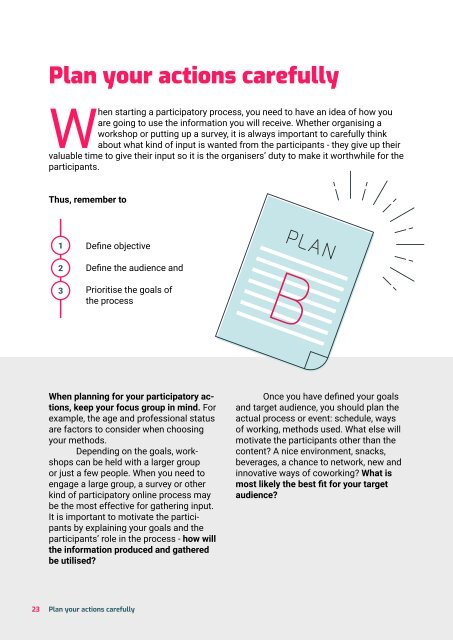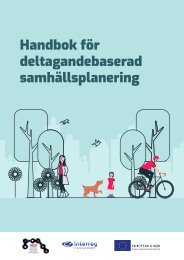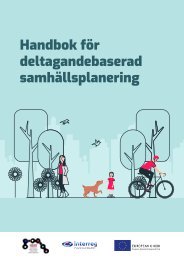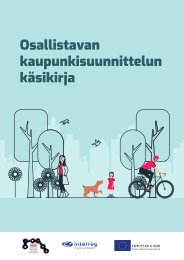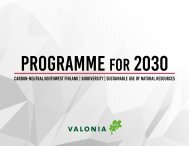Handbook for Participatory Urban Planning
This handbook is a result of an EU-funded project “HEAT - participatory urban planning for healthier urban communities”. For the last two years, the project partners from Finland, Estonia, Latvia and Sweden have worked with more inclusive and participatory processes with a focus on sustainable and healthy communities, particularly related to cycling. Nevertheless, the same principle charts the course, more or less, in any participatory process: you have a goal, and you are trying to find the best available paths to reach it. As the topic is not simple and the change is not happening overnight, we wanted to share our experiences and the knowledge gained during the project with the hope to help or inspire others trying to tackle similar issues.
This handbook is a result of an EU-funded project “HEAT - participatory urban planning for healthier urban communities”. For the last two years, the project partners from Finland, Estonia, Latvia and Sweden have worked with more inclusive and participatory processes with a focus on sustainable and healthy communities, particularly related to cycling. Nevertheless, the same principle charts the course, more or less, in any participatory process: you have a goal, and you are trying to find the best available paths to reach it. As the topic is not simple and the change is not happening overnight, we wanted to share our experiences and the knowledge gained during the project with the hope to help or inspire others trying to tackle similar issues.
You also want an ePaper? Increase the reach of your titles
YUMPU automatically turns print PDFs into web optimized ePapers that Google loves.
Plan your actions carefully<br />
When starting a participatory process, you need to have an idea of how you<br />
are going to use the in<strong>for</strong>mation you will receive. Whether organising a<br />
workshop or putting up a survey, it is always important to carefully think<br />
about what kind of input is wanted from the participants - they give up their<br />
valuable time to give their input so it is the organisers’ duty to make it worthwhile <strong>for</strong> the<br />
participants.<br />
How to communicate effectively?<br />
A<br />
very important matter is the communication - how will you get in touch with<br />
your audience? With a professional audience a personal email invitation may<br />
be the best fit, whereas with residents you may want to consider social media<br />
or newspapers to get the word out. In any case, it is important to think, how to<br />
motivate the potential participants? Their primary motivational factor is probably not<br />
just to help you (unless the matter is very close to their heart) so explain what the participant<br />
will gain in return <strong>for</strong> their time and contribution.<br />
Thus, remember to<br />
1<br />
2<br />
3<br />
Define objective<br />
Define the audience and<br />
Prioritise the goals of<br />
the process<br />
B<br />
PLAN<br />
Which topic would make you sign up <strong>for</strong> a workshop?<br />
We need your input to finish our project<br />
OR<br />
Your input will help us make your<br />
community more functional<br />
When planning <strong>for</strong> your participatory actions,<br />
keep your focus group in mind. For<br />
example, the age and professional status<br />
are factors to consider when choosing<br />
your methods.<br />
Depending on the goals, workshops<br />
can be held with a larger group<br />
or just a few people. When you need to<br />
engage a large group, a survey or other<br />
kind of participatory online process may<br />
be the most effective <strong>for</strong> gathering input.<br />
It is important to motivate the participants<br />
by explaining your goals and the<br />
participants’ role in the process - how will<br />
the in<strong>for</strong>mation produced and gathered<br />
be utilised?<br />
Once you have defined your goals<br />
and target audience, you should plan the<br />
actual process or event: schedule, ways<br />
of working, methods used. What else will<br />
motivate the participants other than the<br />
content? A nice environment, snacks,<br />
beverages, a chance to network, new and<br />
innovative ways of coworking? What is<br />
most likely the best fit <strong>for</strong> your target<br />
audience?<br />
Pay attention to language<br />
and tone of voice. Use<br />
language that everyone<br />
understands - avoid professional<br />
slang and jargon.<br />
Sometimes, it may be difficult<br />
to separate common<br />
knowledge from your expertise.<br />
An easy fix is to have a<br />
co-worker from another field<br />
read through your texts to<br />
check that your messages<br />
and instructions are understandable.<br />
23 Plan your actions carefully<br />
How to communicate effectively? 24


